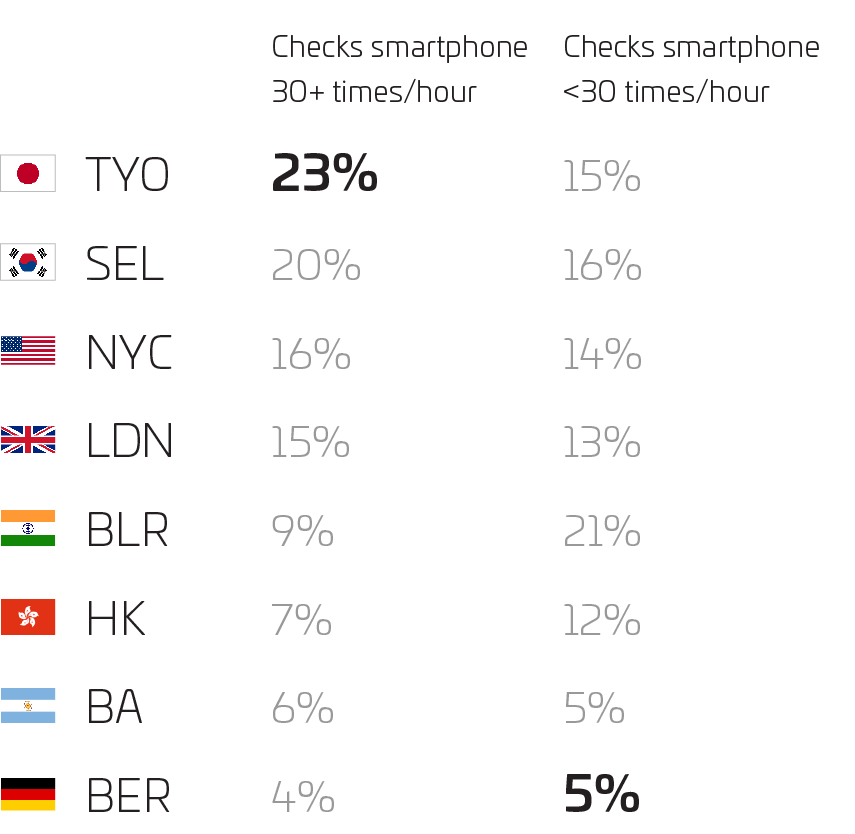
Some smartphone users check devices 30 times per hour Source Shutterstock.com
Generation Z is the most technology-intimate collective in history
“GENERATION Z” is reported to be the most technology-intimate and connectivity-dependent demographic in history, with two thirds of study participants agreeing the age of privacy is over, according to a report by CommScope.
The study found that 63 percent of participants claimed they would find living without their smartphones “extremely difficult”, suggesting a high level dependency on handsets within the demographic. However, as Gen Z – which are defined as those born from the late nineties onwards – currently account for 26 percent of the population, with a projection of 33 percent by 2020, they might never have to live without their smartphone comforters.
With smartphone usage set to increase to a 66 percent penetration rate, Gen Z will undoubtedly be at the forefront of technological innovative disruptions. This will make it essential for current businesses to augment their awareness of technology in order to thrive.
The research was conducted by CommScope, a global leader in infrastructure solutions for communications networks, in partnership with an independent market research firm. The study looked at eight global markets, including New York, Buenos Aires, and included responses from 4,003 respondents aged 13 to 22, also known as Generation Z.
Commscop found that those within this advanced tech generation have unique viewpoints and expectations for the devices, technologies, and people they depended on for their always-on lifestyle.

Average times per hour that Gen Z identifiers check their smartphones
Source CommScope Flickr.com
How do Gen Z view technology?
Time, place and attitude have been identified as the three significant categories in how Gen Z relates to the technology they use and rely on.
Gen Z views technology as a calculation of time, with some of the heaviest users admitting to checking their phones up to 30 times an hour. It’s all about spending time, saving time and wasting time.
In the future, perhaps standard watches will become nothing more than a decadent accessory, and time-telling systems will be replaced with “it is 6 tweets past a Facebook update”, for example.
“Tech intimates, [those] that check their devices every three minutes on average, are set to shape how we live, work and play in the future,” said Fiona Nolan, senior vice president of Global Marketing at CommScope.
“Their attitudes and usage of technology will have a big impact on society, paving the way for significant social, political and technological changes.”

Data showing desired careers of those in study. Source Commscope
As technology increasingly becomes an extension of a user’s identity, Gen Z’s career goals reflect the era around them. The study found that among their respondents, the number one desired career “famous YouTuber”, closely followed by ambitions to create cutting-edge software. Should these dreams fail to pan out, Gen Z-ers would be happy just having one million followers on twitter.
Albert Einstein is said to have predicted that technology would one day surpass human interaction, and that one day could be today. With 50 percent of all respondents saying the Internet – or lack thereof – impacts who they socialize with.
However, it is normal for people to reflect on the trends of their time, and it is no different in this technologically advanced era.
Through their connected devices, Gen Zers exist in a virtual world where expression, enhancement, and entertainment dominate.
The smartphone is their social hub and the epicenter of how they conduct their lives. Around 74 percent of all Gen Z-ers spend their time online, either at school or work. With no sign of technological progression slowing, it is fast becoming essential for education, businesses, and individuals to understand the needs of a technological era.
READ MORE
- Ethical AI: The renewed importance of safeguarding data and customer privacy in Generative AI applications
- How Japan balances AI-driven opportunities with cybersecurity needs
- Deploying SASE: Benchmarking your approach
- Insurance everywhere all at once: the digital transformation of the APAC insurance industry
- Google parent Alphabet eyes HubSpot: A potential acquisition shaping the future of CRM






